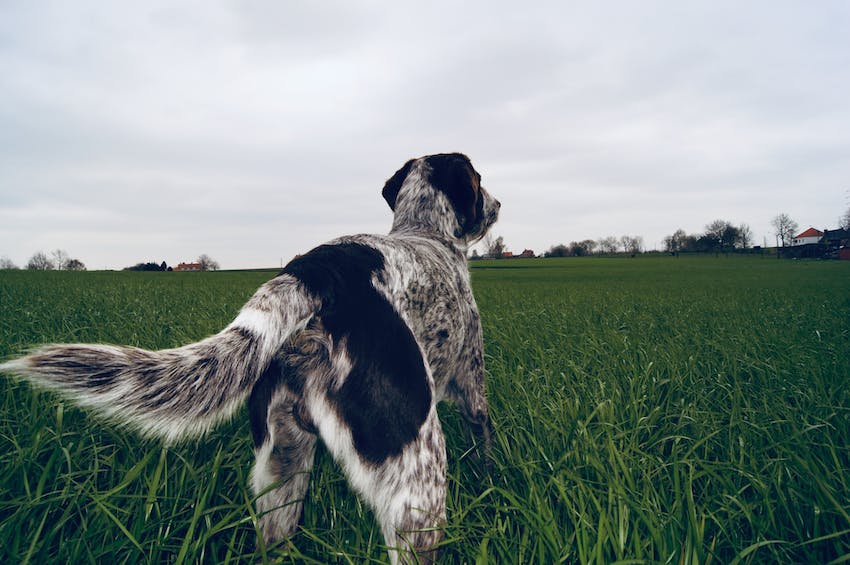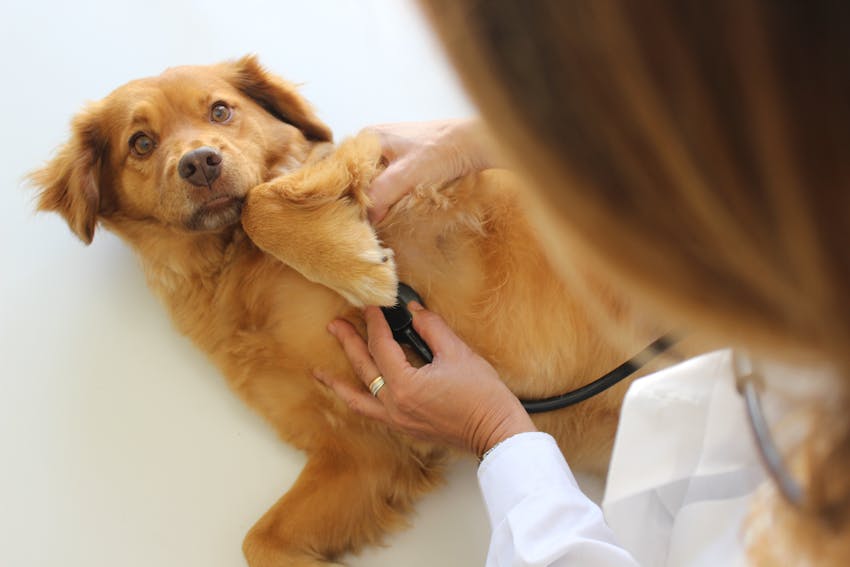Bloat in Dogs: What it is, How to Treat it
By: Trupanion Staff | Updated Sep 26, 2023
Bloat in dogs, also known as Gastric Dilatation-Volvulus (GDV), is a serious condition that can happen to any large breed dog. While still possible, the condition is rarely reported in smaller, deep-chested breeds such as dachshund and Pekingese. It can occur randomly and at a moment’s notice.

Unsurprisingly, dog bloat can be one of the worst issues for pet owners and vets. One minute, your dog will be happy and healthy and the next they’re gasping for breath and suffering immense pain. In severe cases, sudden death can occur.
One of the issues with bloat in dogs is that veterinarians aren’t completely sure why it happens. It’s something of a mystery how a dog’s health can deteriorate so rapidly, often without any previous symptoms. However, there are signs that your dog is suffering from bloating to watch out for and preventive measures. But first, you need to understand the condition itself.
What exactly is bloat in dogs?
Bloat in dogs begins when for unknown reasons the stomach of a dog twists on itself (volvulus) and expands filling with fluid, ingesta and gas (dilatation). It is unclear whether twisting or distension of the stomach occurs first. This causes blood vessels to be compressed, restricting blood flow to organs such as the heart and stomach. Some complications can occur days after treatment. Bloat in dogs is the second leading cause of death in dogs, only following behind cancer.
Bloat in dogs is considered to be a medical emergency for pet owners. If your dog displays any signs of this condition, you should get them to a vet immediately. This is why it is a good idea to carry dog insurance. While you can't predict if an illness like dog bloat will happen to your pet, having good coverage will help ease your worry in times like this.
Signs and symptoms of bloat in dogs
There are various symptoms to watch out for when it comes to bloat in dogs. These include:
- An abdomen that seems swollen
- Constant retching but the inability to actually vomit
- Excessive salivation
- Suffering from fatigue but unable to sleep
- Sudden unexplainable pain when stomach is pressed
Any or all of these symptoms could be a sign of bloat in dogs and should be treated as a medical emergency. You must get your dog treatment as quickly as possible. Progression of the condition can be fast, and a dog can die only a couple of hours after the first symptoms.
Causes and prevention
The risk of bloat in dogs may be lowered if the pet owner is informed and takes certain precautions. Meals should be fed multiple times per day, rather than one large meal. Feed your dog healthy, low-fat meals, do not use raised food bowls, and do not allow rapid eating. It might also help to soak dry food in water before feeding your dog. Most importantly, be sure that the dog waits at least an hour after eating before exercising or getting into stressful situations.
Breed also has an impact on bloat in dogs. In general, deep chested breeds and tall dogs with narrow necks are at more risk. For instance, Great Danes have a 42% chance of developing this medical condition in their lifetime. Likewise, dogs with a first-order relative with a history of GDV are at an increased risk. Other breeds at risk include:
- Akita
- Bernese Mountain Dog
- Boxer
- Collie
- Doberman Pinscher
- Gordon Setter
- Great Dane
- Great Pyrenees
- Greyhound
- Irish Setter
- Irish Wolfhound
- Mastiff
- Newfoundland
- Rottweiler
If you are wondering whether your dog's breed is more at risk of this condition, just check with your vet. Typically, dogs bred from other dogs with a history of bloat are more likely to develop it as well. For this reason, breeding should be given more consideration.
Other risk factors
Certain aspects of your pet's lifestyle can impact their chances of developing canine bloat. These areas include:
- Diet
- Food consumption
- Exercise routines
There may also be increased risk in dogs that have had a splenectomy. Also, older and purebred dogs may be more likely to have GDV.
Due to there being no recognized cause, it’s difficult to pinpoint factors that will cause bloat in dogs. However, many vets suggest that dogs who have one meal a day are more likely to develop the condition compared to those that consume several meals. Fast eaters may be more at risk too as well as though who are eating foods that are heavy in oil and fat. Furthermore, heavy exercise just before or after the dog has finished its meal should be avoided as much as possible. Many researchers believe that high levels of stress can also have an impact.

Is dog bloat always an emergency?
While there are mild cases of bloat in dogs, this should still be considered a serious medical issue. Without the appropriate treatment it could be fatal. As such, even if the symptoms don’t seem severe, you should take your dog to see a vet as quickly as possible.
Surgical intervention
The chance of bloat in dogs can be greatly reduced by surgery. If you have a breed of dog that is more at risk of bloat or may have a history of bloating, this is something that you could consider. Through gastropexy, a dog’s stomach is attached to the wall of the abdomen.
Be aware that this is a preventive action rather than a treatment, although your vet may recommend gastropexy if they have had an episode of bloat. This is due to the fact that 90 percent of dogs who suffer from bloat once will suffer from it again.
Concerned about dog bloat affecting your pet? Talk with your veterinarian. They may be able to determine if your pet is currently at risk or is showing signs of it.
Have you protected your dog against unexpected conditions like dog bloat yet? If not, take a few minutes now to explore your pet insurance options.



